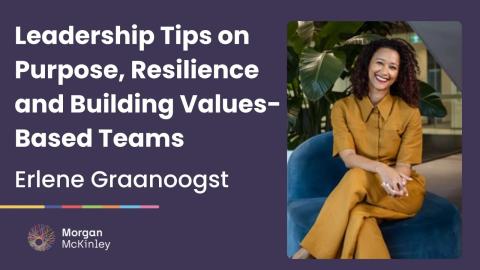Fiona Rankin TAFE NSW: Leadership Tips for Tech

We spoke to Fiona Rankin, the Chief Information Officer at TAFE NSW. This has been her fourth CIO appointment with different organisations. She is also on the Boards for Regional Development Australia Sydney, NSW Smart Sensing Network and the Advisory Committee for the School of Computing and IT (SCIT) at the University of Wollongong
Fiona has a background in finance, and her career changed direction when she accepted a role in programme management at an entrepreneurial startup in the software industry. That started her journey in Information Technology, and she hasn’t looked back.
What factors do you think have been critical to the success you have achieved in your career?
There are three main factors that have contributed to the success I have achieved so far.
Firstly, I focus on understanding the business and not just the technology. Even though I work as a CIO, I need to understand the organisation's purpose—what the business is trying to achieve, and the commercial and social perspectives.
Secondly, I have invested heavily in my own education to help me get into the position to take the next step. I finished my undergraduate degree and followed it with a postgraduate degree in financial management. Then, I was working in the software industry, but I had no formal educational background in IT, so I completed a Master of Business in Information Technology Management.
In terms of education, I would have done things differently today. I could self-educate, take short courses, or develop specialised micro-credentials. I took the long route at the time, but these days, you can get straight into a master's degree without an undergraduate degree if you have the relevant experience. I do not regret the path I took, as I needed to do it at that point in time.
Thirdly, you need to understand yourself and your passion and develop a speciality. With my background in business, I became an expert in Project/Program Management.
What's the most valuable advice you have received in your career and how did it help you?
I thought about this one a lot. I have had lots of advice and lots of wonderful mentors—both male and female—but I think life’s experience and your inner voice give you the best advice.
I will give you an example. While pursuing my degree, I worked various low-level jobs to pay the bills. Many of these roles were dominated by women, and not to be disrespectful, but I knew right away that I wanted my life to be different. They were a lovely group of women, full of character, but my inner voice told me I could not see myself doing this job in 30 years.
I have developed a strong women’s network that has supported me throughout my career and provided valuable advice. During the early part of my career, there would be a handful of women at the various conferences I went to, and I suppose we were drawn to each other and established connections. They have always been there, and we help each other through various challenging situations.
Through this group, we established an informal networking group designed to bring more junior women through the ranks and connect them so we could support each other.
What's the most challenging situation you have faced in your career, and how did you overcome it?
The one that always springs to mind was when I was in a whistleblowing situation involving corruption at the senior management level.
It sticks in my brain as a stressful and nuanced situation. The process involved senior executives, board members, and lawyers, which had implications across the entire organisation.
It was a tough decision because nothing in these situations is ever black and white. Situations like this involve people at the end of the day and people with whom you have a relationship. There were many ramifications to the decisions and actions, and one must be sensitive to the situation and people. It was an awful situation.
I considered my decision and whether I would have made it differently, continuously coming to the conclusion that what I did was the right thing to do. It was a nuanced situation, and holding my own integrity helped me get through.
It was a situation I wish I had never had in my career, but it also helped me grow. I came out as an experienced and stronger leader.
As a leader, I am protective of my team, and we operate with integrity and ensure we use the best practices. We want to do the right thing and follow the right processes.
If you were starting your career now, what would you do differently?
I thought quite a lot about this one, too. I am incredibly happy with my career journey.
I believe one needs to balance experience and knowledge as one progresses through their career. To take on the next role, you need to ensure that you have enough credibility to do so. That does not mean that you need to be an expert in every aspect of the role, but sometimes, people move into roles too early.
I am conscious of this when I am hiring. You do not want to set people up to fail. If it is too early, they crash and burn.
I would say Go hard on seizing opportunities - that’s good, but do not walk into something where you set yourself up to fail. Get into a role where you can manage the pressure and responsibilities and can add value.
My main advice is to understand yourself and your passion, what gets you out of bed, and develop your skills from there.
Another piece of advice, not directly connected, is not to underestimate the power of collaborative effort. Draw on your input and knowledge from multiple sources, whether through creating diversity in the team or even accessing knowledge and information from outside the world. Source input from inside and outside the project or organisation, and that will help you produce innovative and the right solutions.
Why did you choose to work in the technology space and what would you say to other females considering a career in technology?
I have a background in finance, and when a crazy entrepreneur decided to hire me for a software company, that started my journey in IT. I fell into IT and have enjoyed working there since then!
First, I would say IT has a brand problem. Do not be put off by the titles and terminologies; instead, understand the roles of IT, such as cyber-security, business analysis, and quality assurance. I have met amazing women who are at the top of their fields. My advice would be to understand what gets you out of bed and develop your niche.
I am reading a book called Broad Band: The Untold Story of the Women Who Made the Internet. It discusses how the introduction of the different titles and acronyms used in the IT industry has isolated women from the field. But it also demonstrates the historical roles and contributions of numerous women who have played a critical part in the invention of the Internet and how these have been overlooked.
I have travelled the world throughout my career, working for international companies. I have held exciting and challenging roles, transforming multiple organisations through the delivery of digital solutions. I have worked with incredible, high-performing teams and very smart people. In IT, the world is your oyster!
The other thing to remember is that technology is a business. Do not be put off by it; instead, embrace it. Business and technology functions are combining, and women will have a competitive advantage if they are digitally literate, regardless of their background.














